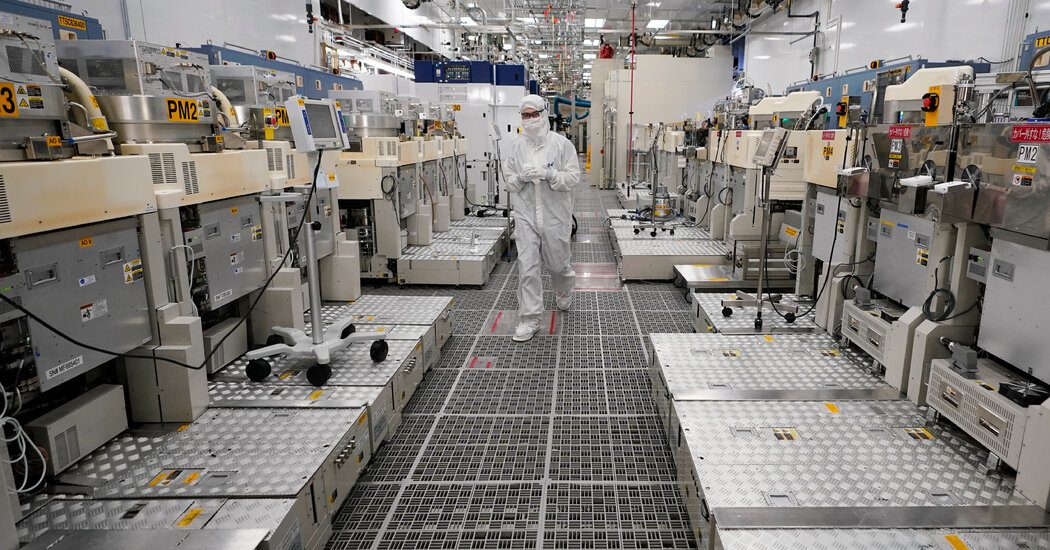Global Courant 2023-05-23 06:15:05
In cutting off foreign tech companies from Chinese supply chains, Beijing has long chosen to work obliquely or even secretly. Supervisors lectured executives in backrooms, burdened them with excessive bureaucratic red tape, or occasionally assaulted them with office raids. Rarely has the government flat out told a company that it was no longer welcome.
But that’s what it signaled to Micron Technology in an overnight announcement on Sunday.
The Chinese government banned companies that process critical information from buying microchips made by Boise, Idaho-based Micron. The company’s chips, which are used for memory storage in all sorts of electronics such as phones and computers, were deemed to have “relatively serious cybersecurity issues” by China’s internet watchdog after an assessment.
Micron said it was “assessing” the government’s finding and “assessing” what it would do next. Analysts said the company, which has been selling chips in China for years, will not be able to do business with Chinese companies in the future.
The openness and speed with which Chinese authorities took action against Micron – they spent less than two months investigating – underline just how far apart the two sides are drifting on technology policy. Last year, the Biden administration took tough steps to block Chinese chipmakers’ access to crucial tools needed to make advanced chips, as well as access to the chips that power supercomputers and create powerful artificial intelligence algorithms.
The Micron move, widely seen as a retaliation for those moves, shows some of China’s advantages over the United States: a swift and dreaded authoritarian rule that can quickly pronounce and enforce absolute prohibitions. It also offers a glimpse of Beijing’s new tactics.
With Micron’s block, authorities created a space in the industry for Chinese chipmakers to fill. The move could also create another wedge between the United States and its allies, whose companies could make billions of dollars in sales if they stepped in and picked up business that Micron could lose.
For Beijing, hurting a US company that makes critical equipment furthers the government’s goal of boosting the domestic tech sector.
“It may not be feasible or necessary to completely replace all products with domestic products, but for these core products we need to develop our own capabilities and avoid becoming overly dependent,” said Xiang Ligang, a director of a technology consortium in Beijing who has advised the Chinese government on technology issues. “This applies not only to the chip industry, but also to other sectors,” he added.
For the better part of a decade, China and the United States have battled for global technology leadership. Chinese computer hacks of US companies and policies aimed at acquiring intellectual property rights raised red flags in Washington. In Beijing, revelations by former US intelligence contractor Edward J. Snowden exposed the vulnerability of relying too much on US technology.
As both sides maneuvered to find new advantages, both turned to the semiconductor industry. The tiny microchips that do the thinking for just about all electronics were a convenient bottleneck for the United States, which cut off China’s access to the smallest and fastest chips. The hope was to make China’s supercomputers less smart and its smartphones less marketable.
To counter Washington, China lavished subsidies on domestic chip leaders. While they failed to catch up with global rivals in the most advanced chips, some companies succeeded with less advanced parts, such as memory chips and larger logic chips that work in lower-end smartphones and cars.
Then, in October, the Biden administration announced a major package of policies targeting China’s most successful semiconductor companies. The move, along with billions in new subsidies for chip manufacturing in the United States, were viewed dimly by Chinese policymakers, said Paul Triolo, the senior vice president for China at Albright Stonebridge Group, a strategic consulting firm.
“Officials in Beijing have complained to anyone who would listen about American actions in recent months,” he said. “Beijing views these steps as primarily politically driven and is now ready to get involved,” Mr Triolo added.
In some ways, China is better equipped for that exchange. China’s authoritarian system allows for quick action and guarantees that few domestic companies will break policy.
In the United States, political debates and legal challenges can dilute the sharpness of government efforts. For example, major US companies found legal solutions to Washington’s attempts to reduce component sales to companies such as Chinese telecom equipment maker Huawei. Some multinationals successfully lobbied for licenses so they could continue selling to blacklisted companies.
By targeting Micron specifically, China is hitting one of the few sectors – memory chips – where it has a foothold in its chip competition with the United States.
While protecting such success by excluding American competitors makes strategic sense, China remains heavily dependent on the United States for advanced chips, according to Teng Tai, an economist and the director of the Wanbo New Economic Research Institute in Beijing.
“The ultimate goal of retaliating against Micron is to encourage certain US companies to hold back so that we can further promote technology and trade cooperation and avoid an isolated and self-reliant approach,” he wrote on Weibo, a Chinese social media platform, on Monday. exhaust pipe.
Another question raised by Sunday’s action against Micron is how the United States’ ally, South Korea, will respond. Its companies, especially Samsung and SK Hynix, have the most to gain from the Micron ban. The two companies are poised to pick up customers from Micron, which reported $3.3 billion in 2022 revenue in China.
Mr Xiang, China’s government adviser, said: “Why should South Korea blindly follow the United States and harm its own interests? I don’t think South Korea has such an obligation.”




